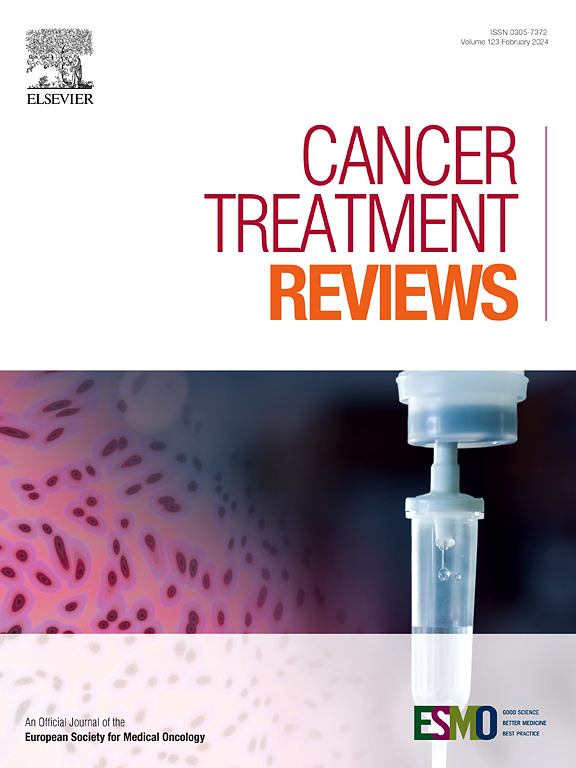CDK4/6抑制剂治疗激素受体阳性、her2阴性转移性乳腺癌的进展后治疗选择
IF 9.6
1区 医学
Q1 ONCOLOGY
引用次数: 0
摘要
细胞周期蛋白依赖性激酶4/6抑制剂(CDK4/6i)联合内分泌治疗(ET)是激素受体阳性(HR +)和her2阴性转移性乳腺癌(mBC)的标准一线治疗方法。尽管他们的疗效,耐药性不可避免地发展,需要替代治疗策略后的进展。本综述探讨了CDK4/6i进展后当前和新兴的治疗方案,重点是内分泌治疗、靶向治疗、联合治疗和继续使用CDK4/6i。内分泌疗法,包括氟维司汀和新型口服选择性雌激素受体降解剂(serd),如elacestrant,显示出希望,特别是在ESR1突变患者中。靶向治疗如PI3K/AKT/mTOR抑制剂,如alpelisib和capivasertib,通过解决涉及耐药的下游信号通路提供了潜力。此外,FGFR抑制剂如厄达非替尼在克服特定耐药机制中的作用正在研究中。CDK4/6抑制剂与免疫检查点抑制剂或其他靶向药物的联合策略也在探索中,早期试验表明可能存在协同效应,但需要进一步验证。CDK4/6抑制剂在某些患者进展后继续使用已显示出潜在的益处,但数据是不均匀的,需要进一步的研究来阐明它们的作用。虽然化疗仍然是在这些治疗中取得进展的患者的标准选择,但目标是通过有效利用内分泌和靶向治疗来延迟其使用。了解耐药机制并根据患者个体情况定制治疗对于优化结果至关重要。正在进行的临床试验有望提供更深入的见解,指导更有效的进展后治疗策略的发展。这一不断变化的形势凸显了持续研究和个性化患者护理的必要性,以提高HR + mBC患者的生存率和生活质量。本文章由计算机程序翻译,如有差异,请以英文原文为准。
Post-progression treatment options after CDK4/6 inhibitors in hormone receptor-positive, HER2-negative metastatic breast cancer
The combination of cyclin-dependent kinase 4/6 inhibitors (CDK4/6i) and endocrine therapy (ET) is the standard first-line treatment for hormone receptor-positive (HR + ) and HER2-negative metastatic breast cancer (mBC). Despite their efficacy, resistance inevitably develops, necessitating alternative therapeutic strategies post-progression. This review explores current and emerging treatment options following progression on CDK4/6i, focusing on endocrine therapies, targeted therapies, combination approaches, and the continued use of CDK4/6i. Endocrine therapies, including fulvestrant and novel oral selective estrogen receptor degraders (SERDs) like elacestrant, show promise, especially in patients with ESR1 mutations. Targeted therapies such as PI3K/AKT/mTOR inhibitors, exemplified by alpelisib and capivasertib, offer potential by addressing downstream signaling pathways involved in resistance. Additionally, FGFR inhibitors like erdafitinib are under investigation for their role in overcoming specific resistance mechanisms. Combination strategies involving CDK4/6 inhibitors with immune checkpoint inhibitors or other targeted agents are also being explored, with early trials suggesting possible synergistic effects, although further validation is required. Continuation of CDK4/6 inhibitors beyond progression has shown potential benefits in selected patients, but the data are heterogeneous, and further studies are needed to clarify their role. While chemotherapy remains a standard option for patients who progress on these treatments, the goal is to delay its use through the effective utilization of endocrine and targeted therapies. Understanding resistance mechanisms and tailoring treatment to individual patient profiles is crucial for optimizing outcomes. Ongoing clinical trials are expected to provide deeper insights, guiding the development of more effective post-progression therapeutic strategies. This evolving landscape highlights the need for continuous research and individualized patient care to improve survival and quality of life in HR + mBC patients.
求助全文
通过发布文献求助,成功后即可免费获取论文全文。
去求助
来源期刊

Cancer treatment reviews
医学-肿瘤学
CiteScore
21.40
自引率
0.80%
发文量
109
审稿时长
13 days
期刊介绍:
Cancer Treatment Reviews
Journal Overview:
International journal focused on developments in cancer treatment research
Publishes state-of-the-art, authoritative reviews to keep clinicians and researchers informed
Regular Sections in Each Issue:
Comments on Controversy
Tumor Reviews
Anti-tumor Treatments
New Drugs
Complications of Treatment
General and Supportive Care
Laboratory/Clinic Interface
Submission and Editorial System:
Online submission and editorial system for Cancer Treatment Reviews
 求助内容:
求助内容: 应助结果提醒方式:
应助结果提醒方式:


